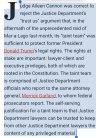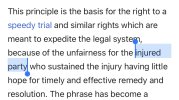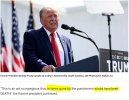That is irrelevant to whether or not a fraud was committed. If you send an email to people offering an investment opportunity that pays a guaranteed, risk-free interest rate of 15%, but your plan is to run a ponzi scheme instead, in which you pay early investors with the money you collect from later investors, you are committing fraud.“Injured party”: The Big Banks received their money back with interest and sometimes earlier than the terms of the loan.
Even if no one accepts your offer, even if no one sends you a dime, you have still committed fraud.
In that case, the victim is the general public and honest financial institutions who deserve and expect a level playing field and fraud-free financial transactions.
In Trump's case, even if the banks knew Trump was lying about his fraudulent financial statements, and even if they turned a blind eye to them so they could make money on the higher rates they would charge and big loans they would make, and even if they had no complaints and the loans were fully repaid, Trump still committed fraud. He said something that was untrue to gain unfair financial advantage over others who complied with the law.
This is no longer an item of debate. The case has been adjudicated in court and Trump has indeed been found liable for fraud. Wanting to continue the debate and to have the ruling reversed, Trump has appealed to a higher court. I am confident that the ruling will be upheld. Trump committed fraud. The evidence shows it. The court ruled that he did it.




